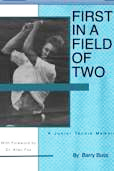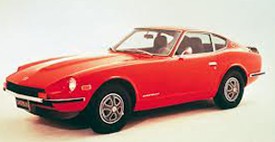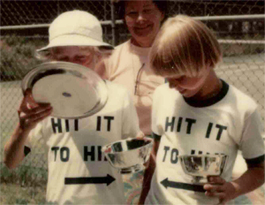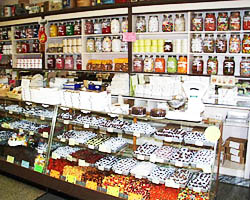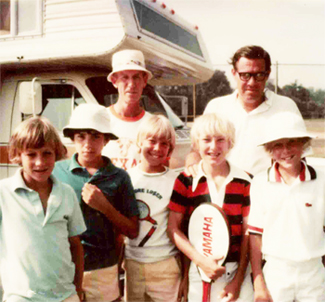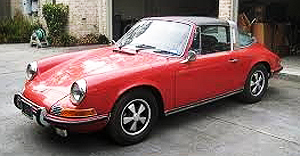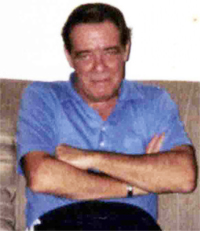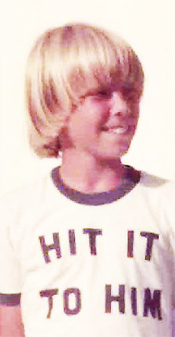The first fateful rides home with Dad in a 240Z.
There were a lot of drives home, just Dad and me in his two seater sports cars. I would spend a lot of time in the passenger seats of those cars.
In the beginning, I was 9 at the time, the drives were somewhat tame. Often early before school on a wintry New England's morning, we would practice at a frigid inflatable bubble ten minutes down the road.
Dad was unstoppable. Blizzards could not deter him, and we would often follow the snowplow down the dark, empty country roads as it made driving the icy slick lanes just a slight bit less perilous.
Dad and I would play an hour. He was as patient as he could be. Which wasn't very. The rides home would be filled with alternating words of encouraging instruction
and stinging consternation.
I learned early on those rides home that trying extra hard and playing well was
the best defense against the sharp barbs that could come my way. It was his best bedside manner, which in retrospect -wasn't very mannerly, but his method and
tone were all I knew, I had nothing else to compare it to. I just assumed this was how every kid was spoken to, so it became my normal, a normal I would have to get accustomed to.
Tournament tennis was soon upon us, which meant the drives home soon got longer as I played events within the greater Boston area. Going in a sports car meant
these were not to be family outings. It was just Dad and me and my tennis.
Local tournaments were somewhat sparse back then and there, maybe one a month, but the stakes were amplified greatly now that I was competing, or as I would understand much later, we were competing.
The initial events were unremarkable; I beat whom I was supposed to, got smashed by the top seeds. Dad was in full observation mode, absorbing all the details of the junior tennis experience, for he knew we were going to be spending a lot of weekends at these places and with these people.
Winning and trophies were cool stuff—I imagined Dad was proud. That's me on the right.
It wasn't long in my tournament play, about 6 months, before I won my first
tournament and of course my first tennis trophy. Winning and trophies are cool stuff for a little kid, and I have to imagine it was pretty cool for him too, a fun, rewarding drive home, proud Dad and happy kid with his winner's trophy. Good times.
The drives home soon began to get much longer. Dad was getting a hunger for this tournament stuff.
Before long, we were venturing out of state and even further, to out of our section events for better and better competition: Providence, Albany, Southern Connecticut and before long to the mecca of junior tennis, Long Island's Port Washington Junior Tennis Academy.
Those drives home were much, much longer and therefore those tournaments took on greater significance in time, not because of the stiffer competition involved, but for the rewards and consequences that ensued depending upon my results.
If I played well, there was always this giant candy store we would stop at in Central Connecticut to load up and feast away for the multi-hour drive. Poor efforts were
not so sweet. Harsh verbal lashings with no place in the car to hide followed by dead silence; long lonely hours of mind-numbing night driving with no music, no conversation, just two people in a small car.
We were together but separate, him smoking and staring straight ahead, and me with my face stuck to the fogging window, straining to see the darkness outside while feeling all the darkness inside. I spent hour upon hellish hour trying to create a more pleasing reality out of the outer void, all the while trying not to descend in to the one within.
Victory was rewarded at the candy store.
And then the drives became trips. They were not all grim though. I was now an elite junior tennis player. For those of us fortunate enough to be successful locally, we were asked to represent our respective sections in national tournaments all throughout the
country and calendar year.
And so it was in July of 1976, I qualified, entered, and set forth to travel to my first national tournament in the 12 and under division of the USTA, at The Clay Courts, in Winston Salem, North Carolina, not realizing then that I was embarking on an a very unique and challenging way to grow up.
There we were on a sweltering summer day of the bicentennial year 1976, Dad and I picking up the motor home from the RV rental place, then a quick drive into greater Boston. We had picked up three more of my 12 and under peers from NELTA, and it was South we went to pick up another father–son combination in Southern Connecticut to make our ensemble complete.
My father, one other father, and four of my new best friends from the 12 and under
division of New England careening our way down the Eastern Seaboard to do battle at our first ever national event.
The event was memorable, not in the least of having other people around me when I lost, for it provided me cover, at least for a while. Still Dad would find times to get me alone and get a little of that self-disgusted meanness off his chest, but others would
soon arrive, filling that growing space between us. I had friends to goof and play with, saving me from the confined silence of the sports car.
A rented RV, two dads, my best friends, our first national tournament, and some cover, for a while.
The next summer came a big trip. I had qualified for the 14 and under hard courts in Fort Worth, Texas. There would be no RV trip with buddies; it was going to be me
and Dad for a week straight alone, and I was anxious for the trip for many reasons.
Maybe he knew he had been crossing the line; maybe he had checked out the
scene enough by now and knew it was safe for me, but the night before the tournament he sat me down and gave me a couple sheets of paper, "Here's your plane ticket and here is the transportation information you will need when you land and here is some money to get you through the week, call us collect when you get to your housing and good luck, okay? Your mother is going to take you to the airport in the morning."
And that was it. Mom dropped me off at Logan Airport in Boston, suitcases in tow, for a big tournament in a place I had never been and did not know all alone and on my own. In this day and age many might think that child abuse or child endangerment.
I thought it one of the greatest things ever, complete freedom, freedom to do whatever I wanted and freedom from him. I celebrated said freedom by rushing out to Dunkin' Doughnuts and getting myself a dirty dozen cream filled whatevers, securing myself a sleepless night and a world class stomach ache the evening before my first match.
I performed well at the event though, made it to and fro without a hitch, and won the trust of my Dad that I could go to such events by myself without incident. And that's how I would travel for all the remaining years of my junior tennis experience, alone and on my own.
But air travel was the exception. The majority of my events involved myself, Dad, and whatever two-seated car he was driving at the time. As I did better and better, the stakes got higher, going deeper in to bigger tournaments, playing competitively with some of the nation's best, and beating some of them.
Another of dad's two seaters on the rides home: a 911 porsche.
Dad was getting into this and with that came expectations and pressure to perform better and better. Roll all that up into a big ball and you have winning.
It all became about winning, and not just winning, but complete efforts start to finish, perfectly played, perfectly behaved. Anything less than perfect was unacceptable
and had consequences, and those consequences would be played out in long drives home, away from others' eyes and ears, a young boy and an angry father.
Angry at what I would never learn.
I didn't have a voice at that young age. I was incapable of explaining myself as to why I could not live up to his standards every tournament. I was also incapable of
defending myself when his rage would start a-raining down.
He was very intimidating, and had a booming voice which just paralyzed me when he would start in. I feared the outbursts. I feared the physical retaliation I would get if I ever fought back.
Dad: a booming voice and angry, but I never found out at what.
I most feared the silences that would follow afterwards: to feel so violated, demeaned, then discarded and abandoned. Being on the wrong side of conditional love was the breeding ground for high anxiety of which my brothers and I got healthy doses.
But it was also the breeding ground to a whole lot more traits that would deflne and dominate my adult years and make living a prosperous healthy life quite complex.
I often wonder if I had the courage to express myself back then, would it have made a difference?
If I had the emotional intelligence to put in to words what it was like for me on those drives home, sitting there at the launch pad for his rage, yet invisible to him, how could
he not have known the damage he was doing? Or how could he live with himself if he did know?
Dad, did you know what I was thinking back then? When I turned away from you to look out in to the pitch-black darkness for something that would make me feel alright, I would
stare out into an abyss of endless nothing rather than turn my attention back toward you.
Did you know what I was thinking? What I wanted to say? You got me right where you want me now, don't ya? Gave you three hours on the court to figure out what you want to say ... got any new material?
That other shit is stale man .. .I've heard it too many times now ....what do ya got
for me this time? We got a couple hours drive ... pace your rage you asshole .... you know I can't say that to you .. . but if I could I would say a lot more than that...I'd
pop you in the fucking mouth if I could.
I mean, I could ... you're almost sick enough to respect me for doin' so ... but that's a risk I can't take ... cause we're a long way from “home” ... that house I sleep in ... are you trying to toughen me up? Well you did.
Age 12 and I didn't have a voice.
Are you trying to break me? Well you can't break me .. But you've destroyed us. Damn right...yeah you have ... am ! just supposed to shake these words off? Carry on like
nothing was said between us on these drives home?
Did you know when you're yelling at me, when you're getting stuff off your mind .. .it's being permanently lodged in mine .. and I don't know how to forget those words ... .I can't let go of something I never had a handle on ... that never belonged to me .... and I just so want to throw every fucking one of them right back at ya .. . but
they're inside of me and I can't find 'em ... can't locate 'em ... they just show up sometimes ... and when they appear, I want to give 'em back to you so bad ...
But you know what? .. I don't give 'em back to ya cause I don't want to hurt ya and how fucking sick is that ... I think they call it Stockholm Syndrome ... and I want to you
thank you for all that ... I really do ... and much much more.
I would have been able to love to say to you then ... before ! knew it was not okay to respond to abuse with abuse ... and I struggle with all that all the
time, did you know that? .. battling my confusion ... so thankful for all you did for me .... so angry at all you did to me ... and just unable to fully forget how you made me
feel...for memories only die when we do ... all those memories of those long drives home.


